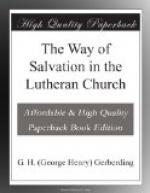But the child must be instructed. Begin early. Let it learn to pray as soon as it can speak. Let it use its first lispings and stammerings in speaking words of prayer. We quote again from Luthardt: “Let it not be objected that the child cannot understand the prayer. The way of education is by practice to understanding, not by understanding to practice. And the child will have a feeling and a presentiment of what it cannot understand. The world of heavenly things is not an incomprehensible region to the child, but the home of its spirit. The child will speak to his Father in Heaven without needing much instruction as to who that Father is. It seems as though God were a well-known friend of his heart. The child will love to pray. If mother forgets it, the child will not.”
Therefore, oh, ye parents! pray for your child. Pray with your child. Teach that child to pray. The writer knows of a little girl who came home from Sunday-school and said: “Mamma, why don’t you ever pray?” What a rebuke!
The child must be taught the truth of God’s Word. It also must be sanctified, i.e., made more and more holy “through the truth.” As a child it needs first the “milk of the Word.” It is not desirable, neither is it necessary, to try to teach the very young child doctrines and abstract truths. Neither ought the child to be required to learn by rote long passages from the Scriptures. In this way some well-meaning, but mistaken parents make the Word a burden to their children, and it becomes odious in their eyes. There are other and better ways. Begin by showing the child Bible pictures, even if it should soil the book a little. Better a thousand times have its lessons of life and love graven on the heart of the child, than to have its fine engravings as a parlor ornament for strangers. In our day there is also an abundant supply of Bible pictures and story books for children. Those parents who have never tried it will be surprised to see the interest the little ones take. With the pictures connect the stories of the Bible. And where are the stories better calculated to interest a child than these same old stories, that have edified a hundred generations? When will children ever weary of hearing of Joseph, and Moses, and David, and Daniel, and especially of Him who is the special Friend of children? It will be easy to so connect the teachings of the Word with these pictures and stories that very young children will be able to distinguish right from wrong, to know and hate sin, and to be drawn ever nearer to the blessed Jesus.
As they become able to study, to think and to comprehend it, the judicious parent will be glad to avail himself of the help of Luther’s Catechism. Here the more important teachings of the Word are summarized and systemized.
Most parents indeed are glad to shirk this duty, and flatter themselves that if they send their children to catechetical class, when they grow old enough, they have performed their whole duty. Such parents do not perhaps know, that Martin Luther wrote his Small Catechism especially for family use. Let them take their Church books and turn to the Catechism, and they will find that Luther heads the Ten Commandments with the words: “In the plain form in which they are to be taught by the head of the family.”




